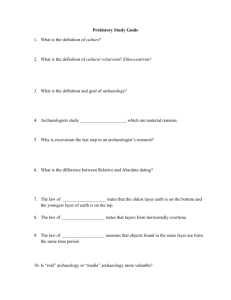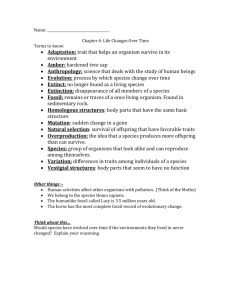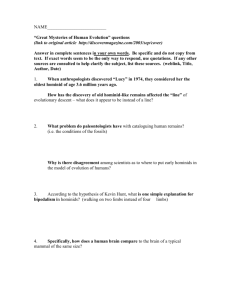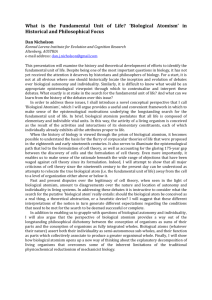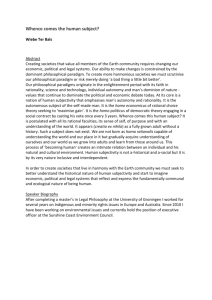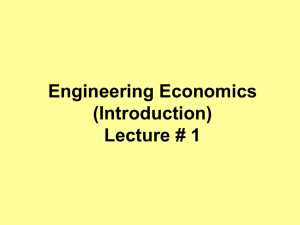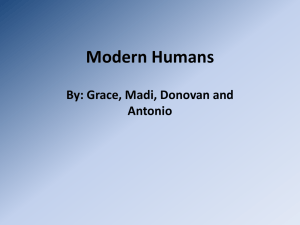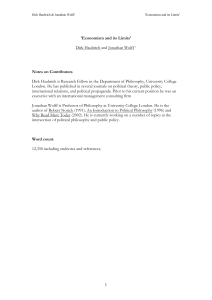Econ Link - Agamben - University of Michigan Debate Camp Wiki
advertisement
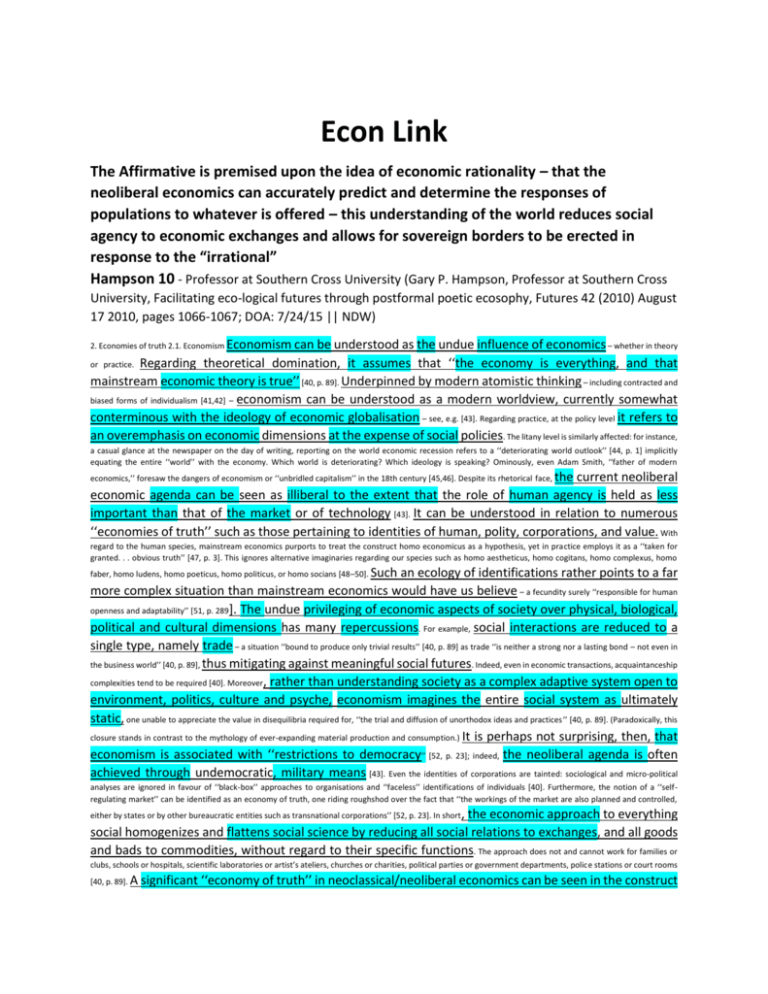
Econ Link The Affirmative is premised upon the idea of economic rationality – that the neoliberal economics can accurately predict and determine the responses of populations to whatever is offered – this understanding of the world reduces social agency to economic exchanges and allows for sovereign borders to be erected in response to the “irrational” Hampson 10 - Professor at Southern Cross University (Gary P. Hampson, Professor at Southern Cross University, Facilitating eco-logical futures through postformal poetic ecosophy, Futures 42 (2010) August 17 2010, pages 1066-1067; DOA: 7/24/15 || NDW) 2. Economies of truth 2.1. Economism Economism can be understood as the undue influence of economics – whether in theory or practice. Regarding theoretical domination, it assumes that ‘‘the economy is everything, and that mainstream economic theory is true’’ [40, p. 89]. Underpinned by modern atomistic thinking – including contracted and biased forms of individualism [41,42] – economism can be understood as a modern worldview, currently somewhat conterminous with the ideology of economic globalisation – see, e.g. [43]. Regarding practice, at the policy level it refers to an overemphasis on economic dimensions at the expense of social policies. The litany level is similarly affected: for instance, a casual glance at the newspaper on the day of writing, reporting on the world economic recession refers to a ‘‘deteriorating world outlook’’ [44, p. 1] implicitly equating the entire ‘‘world’’ with the economy. Which world is deteriorating? Which ideology is speaking? Ominously, even Adam Smith, ‘‘father of modern economics,’’ foresaw the dangers of economism or ‘‘unbridled capitalism’’ in the 18th century [45,46]. Despite its rhetorical face, the current neoliberal economic agenda can be seen as illiberal to the extent that the role of human agency is held as less important than that of the market or of technology [43]. It can be understood in relation to numerous ‘‘economies of truth’’ such as those pertaining to identities of human, polity, corporations, and value. With regard to the human species, mainstream economics purports to treat the construct homo economicus as a hypothesis, yet in practice employs it as a ‘‘taken for granted. . . obvious truth’’ [47, p. 3]. This ignores alternative imaginaries regarding our species such as homo aestheticus, homo cogitans, homo complexus, homo faber, homo ludens, homo poeticus, homo politicus, or homo socians [48–50]. Such an ecology of identifications rather points to a far more complex situation than mainstream economics would have us believe – a fecundity surely ‘‘responsible for human openness and adaptability’’ [51, p. 289]. The undue privileging of economic aspects of society over physical, biological, political and cultural dimensions has many repercussions. For example, social interactions are reduced to a single type, namely trade – a situation ‘‘bound to produce only trivial results’’ [40, p. 89] as trade ‘‘is neither a strong nor a lasting bond – not even in the business world’’ [40, p. 89], thus mitigating against meaningful social futures. Indeed, even in economic transactions, acquaintanceship complexities tend to be required [40]. Moreover, rather than understanding society as a complex adaptive system open to environment, politics, culture and psyche, economism imagines the entire social system as ultimately static, one unable to appreciate the value in disequilibria required for, ‘‘the trial and diffusion of unorthodox ideas and practices ’’ [40, p. 89]. (Paradoxically, this closure stands in contrast to the mythology of ever-expanding material production and consumption.) It is perhaps not surprising, then, that economism is associated with ‘‘restrictions to democracy’’ [52, p. 23]; indeed, the neoliberal agenda is often achieved through undemocratic, military means [43]. Even the identities of corporations are tainted: sociological and micro-political analyses are ignored in favour of ‘‘black-box’’ approaches to organisations and ‘‘faceless’’ identifications of individuals [40]. Furthermore, the notion of a ‘‘selfregulating market’’ can be identified as an economy of truth, one riding roughshod over the fact that ‘‘the workings of the market are also planned and controlled, either by states or by other bureaucratic entities such as transnational corporations’’ [52, p. 23]. In short , the economic approach to everything social homogenizes and flattens social science by reducing all social relations to exchanges, and all goods and bads to commodities, without regard to their specific functions. The approach does not and cannot work for families or clubs, schools or hospitals, scientific laboratories or artist’s ateliers, churches or charities, political parties or government departments, police stations or court rooms [40, p. 89]. A significant ‘‘economy of truth’’ in neoclassical/neoliberal economics can be seen in the construct of utility and its use in utility theory. Although the idea of utility maximization was formulated in the 16th century, it was Jeremy Bentham’s utilitarianism which brought utility to center stage; and it soon formed the backbone of economics [53,54]. Utility is built upon a modern atomistic template such that it is potentially quantifiable through the measurement of ‘‘utils.’’ Whilst utilitarianism was originally used, for example, to advocate for women’s rights, homosexual decriminalisation, socialism and animal rights – over time it has tended toward a certain reductionism. (This need not be the case: the importance of prioritising the address of climate change could, for example, be supported by a rich interpretation of utility.) Notably, the concept was progressively ‘‘purged of psychological reference’’ [54, p. 3] by neoclassical economics, and happiness became reduced to consumer choice. Since Bentham’s time, the release from conservative norms has also been a mixed blessing in that utilitarianism had the unseen consequence of lifting the former religious ban on greediness [55]. The situation is not assisted by the tendency for utilitarian maxims ‘‘to subordinate cooperation to competition’’ [56, p. 36]. Arguably, its ethical heritage was severed by the rise of artificially stimulated economic demand. By the early 20th century in the U.S. for instance, production capacity had outgrown demand; demand was then The emergent associated rise of corporation culture and the ideology of managerialism with its forms of accountability and non-futures- oriented ‘‘emphasis on short-term performance contracts’’ [57, p. 110] is also economistically implicated. Who manages well-being? Who manages the managers? How much are we undervaluing the construction and empowerment of organisations dedicated to expanding our moral, literary, scientific and mystical imaginations [58]? Such vision requires a different order than economism or the modern atomism on which it rides. 2.2. Modern atomism Modern atomism9 privileges explanation derived from simple, homogenous units – atoms – rather than complex entities. It can be regarded as an economy of truth, reducing the domain of truth legitimacies. Mathematics, the digital metaphysics of computing, and technology in general accord with modern atomism [60–62]. It also forms the basis of much modern scientific thought . Although the overapplication of mathematics can lead artificially stimulated through marketing [55]. to a undue limitations regarding understanding [63], it would seem that the material successes of digitally-based knowledge and production – a situation catalysed by Descartes’ mechanistic philosophy – has seduced us into believing that more analogical modalities are fundamentally less valuable. Yet the make-up of our cerebrum rather seems to suggest an equal legitimacy – and interaction – between the more digital left hemisphere and the more analogical right one. An analogy to Modern atomism forms a key basis for the principle of techne´ which involves constructions of pre-given atomistic components (whether material or ideational/linguistic). If techne´ is regarded without non-technical context or consideration, an incomplete event occurs – it loses sight of its own poiesis, its own creative poetry, so to speak: techne´ becomes downsized, made economic; meaning is reduced, and the limitations of the actuality and metaphor of machine introduced. Narrow science and conventional society remain disenchanted, unable to break free of the ratio template of ‘‘small r’’ rationality toward more holistic understandings [65,66]. Yet ‘‘many concrete situations even in physics, in chemistry and in engineering are not amenable to a simple causal and experimental methodology. . . demographic, economic, political and social phenomena are still less understandable using only classical models’’ [67, p. 618] (added emphasis). Modern atomism in the sphere of language can be termed prosaicism or literalism. This such a relationship can perhaps be seen in Heidegger’s discussion of techne´ and poiesis [64]. perspective states that ‘‘our natural language consists of fundamental terms characterized as atoms’’ [68, p. 143]. Undue value is given to the conventional, literal or ‘‘functional’’ over richer understandings and uses of language indicated by postmodernism’s linguistic turn. Logical atomism is implicated through the notion that In general, ‘‘ambiguity or any other sign of a lack of clarity and distinctness is understood to be nothing more than a problem that needs to be fixed through further purifications and severances’’ [69, p. 154]. It can be said that the fallacy ‘‘propositions [can] be easily divided into those with truth values which [are] descriptive, and those that [are] . . . value judgements’’ [54, p. 12]. of literalism, like the fallacy of objectivity and progress, derives from a society which can accord significance only to fact and figure, to testable unambiguous data and This includes the devaluing of metaphor which is often viewed negatively by many academics and administrators [71]. Yet language substantively involves the layered use of metaphor [72,73]. Indeed, ‘‘metaphorical thought is what makes abstract scientific theorizing possible’’ [74, p. 128]. Another form of modern atomism is the undue influence of disciplinary approaches to knowledge. Etymologically, discipline comes from the Latin discipere (‘‘to grasp intellectually, analyze thoroughly’’ – hard statistics [70, p. 95]. literally ‘‘to take apart’’) via discipulus (‘‘pupil’’) and disciplina (‘‘instruction given to a disciple’’). Its etymological roots are thus entwined with separation and analysis – and so somewhat kin to science’s root, scindere (‘‘to cut, divide’’). ‘‘ The standard image of [the] disciplinary order is that of a universe neatly divided in a large number of only slightly overlapping areas, each one being the speciality of a particular group of professional experts’’ [75, pp. 23–24]. As such, disciplinism classifies both the world and its observers through ‘‘the erection of rigid boundaries’’ [76, p. 104] in contrast to transdisciplinary approaches. Imagining disciplines as homogenous atoms, however, is not accurate. They are decidedly heterogeneous. Additionally, their inherent fuzziness is such that ‘‘sometimes arbitrariness is involved in calling one area a ‘discipline’ and another an ‘intersecting field.’ Geography, for example, might qualify for either list, as might education and linguistics’’ [77, pp. 60–61]. Such reductionism can occur both among disciplines and within them. With respect to the former, bibliometrics often provide misleading accounts [78, p. 2]; with respect to the latter, up to the mid-twentieth century, most scientific disciplines obeyed the principle of reduction of the knowledge as a whole to knowledge of its parts, as if the organization of an entity did not produce new qualities or properties with respect to the parts taken in isolation [48, p. 35]. In general, ‘‘disciplinarian thinking seems to be unable to cope with the complexity which is overwhelming us’’ [79, p. 3].

